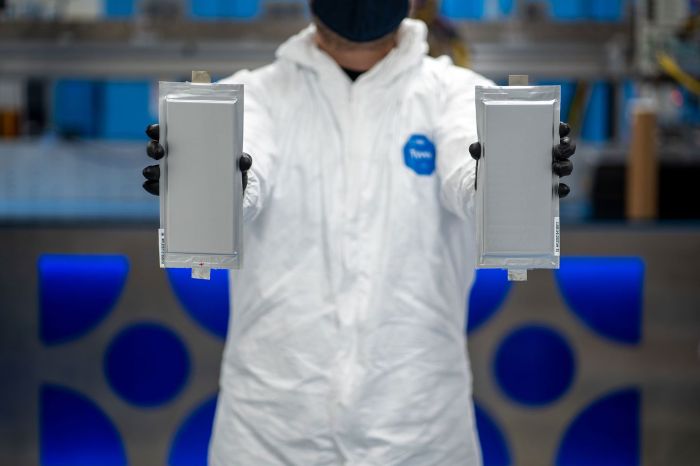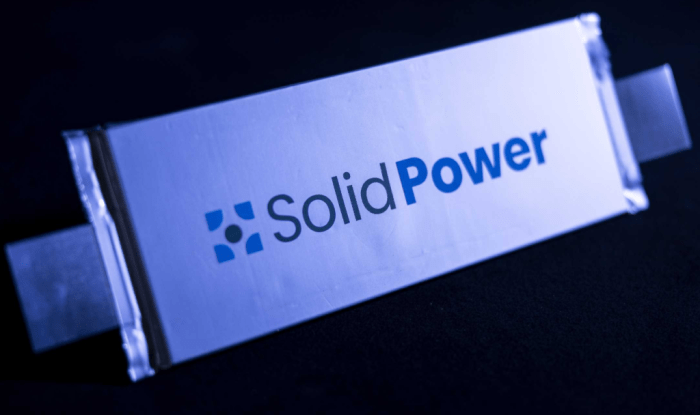BMW’s Strategic Partnership with Solid Power
The automotive industry is experiencing a rapid shift towards electric vehicles (EVs), driven by environmental concerns and technological advancements. In this evolving landscape, battery technology plays a crucial role, and solid-state batteries are emerging as a promising solution due to their potential for higher energy density, faster charging, and improved safety compared to traditional lithium-ion batteries. BMW’s strategic partnership with Solid Power, a leading developer of solid-state battery technology, reflects the German automaker’s commitment to driving innovation in the EV market.
Benefits for BMW
BMW’s partnership with Solid Power provides several strategic advantages. Firstly, it grants BMW access to cutting-edge solid-state battery technology, enabling the development of next-generation EVs with enhanced performance and range. Secondly, this collaboration positions BMW as a frontrunner in the rapidly growing EV market, giving it a competitive edge over rivals. Solid-state batteries offer the potential for longer driving ranges, faster charging times, and improved safety, making them highly desirable for EV consumers. By securing access to this technology, BMW aims to differentiate its EV offerings and attract a wider customer base. Thirdly, the partnership allows BMW to leverage Solid Power’s expertise and accelerate the development of its own solid-state battery technology, reducing the time to market for its next-generation EVs.
Strategic Rationale for Solid Power
Solid Power’s collaboration with BMW is a strategic move to expand its market reach and accelerate the commercialization of its solid-state battery technology. Partnering with a major automaker like BMW provides Solid Power with a significant platform to showcase its technology and gain valuable insights into the automotive industry’s requirements. The partnership also provides Solid Power with access to BMW’s extensive manufacturing and distribution networks, enabling it to scale up production and bring its solid-state batteries to market more quickly. Moreover, the collaboration strengthens Solid Power’s credibility and attracts potential investors, accelerating its growth and development.
Solid-State Battery Technology
Solid-state batteries represent a revolutionary advancement in energy storage technology, poised to transform the landscape of electric vehicles (EVs). These batteries utilize a solid electrolyte instead of the liquid or gel electrolytes found in conventional lithium-ion batteries, offering a range of advantages that could propel EV adoption to new heights.
Advantages of Solid-State Batteries
Solid-state batteries offer several key advantages over conventional lithium-ion batteries, making them a compelling alternative for EVs.
- Higher Energy Density: Solid-state batteries can store more energy in the same physical space compared to lithium-ion batteries. This translates to longer driving range for EVs, addressing a major concern for potential buyers. For instance, a solid-state battery pack could potentially deliver a range of over 500 miles on a single charge, significantly exceeding the range of current EVs.
- Enhanced Safety: Solid electrolytes are inherently less flammable and more stable than liquid electrolytes. This reduces the risk of fires or explosions, enhancing the safety of EVs. The solid nature of the electrolyte also prevents the formation of dendrites, which can cause short circuits and battery failure in lithium-ion batteries.
- Faster Charging: Solid-state batteries can charge much faster than conventional lithium-ion batteries. This is due to the higher ionic conductivity of solid electrolytes, which allows for quicker transfer of lithium ions during charging. With faster charging times, EV users could spend less time tethered to charging stations, making the ownership experience more convenient.
Impact on the Future of EVs
The widespread adoption of solid-state battery technology could have a profound impact on the future of EVs, driving significant advancements in several key areas.
- Increased Range: As mentioned earlier, the higher energy density of solid-state batteries enables EVs to achieve longer driving ranges, potentially exceeding 500 miles on a single charge. This could significantly alleviate range anxiety, a major barrier to EV adoption, and encourage more people to make the switch to electric vehicles.
- Improved Performance: Solid-state batteries can handle higher power outputs compared to lithium-ion batteries, leading to improved acceleration and overall performance for EVs. This could make EVs more appealing to performance-oriented drivers, expanding the market for electric vehicles.
- Reduced Cost: While currently more expensive to produce than lithium-ion batteries, solid-state battery technology is expected to become more cost-effective as production scales up. As manufacturing processes improve and economies of scale are achieved, the cost of solid-state batteries is projected to decrease, making EVs more affordable for a wider range of consumers.
Technical Challenges and Research & Development Efforts, Bmw teams up with solid power for solid state batteries
Despite the promising advantages of solid-state battery technology, there are several technical challenges that need to be addressed before it can be widely adopted.
- Scaling Up Production: One of the biggest challenges is scaling up production of solid-state batteries to meet the demands of the growing EV market. Current production methods are still relatively expensive and time-consuming, hindering the widespread adoption of this technology.
- Improving Cycle Life: Solid-state batteries currently have a shorter cycle life compared to lithium-ion batteries, meaning they can withstand fewer charge-discharge cycles before degrading. Research and development efforts are focused on improving the cycle life of solid-state batteries to ensure they can meet the demands of long-term EV use.
- Developing New Materials: Solid-state batteries require the development of new materials with specific properties, such as high ionic conductivity, good mechanical strength, and compatibility with the electrode materials. Researchers are actively exploring new materials and chemistries to optimize the performance and cost-effectiveness of solid-state batteries.
Research and development efforts are underway to address these challenges and accelerate the commercialization of solid-state battery technology. Governments and private companies are investing heavily in research, development, and manufacturing of solid-state batteries. These efforts are aimed at overcoming the technical hurdles and bringing the benefits of this revolutionary technology to the market, paving the way for a future dominated by electric vehicles.
The Future of BMW’s Electric Vehicle Lineup
BMW’s partnership with Solid Power, a leading developer of solid-state battery technology, signifies a significant step towards revolutionizing the electric vehicle landscape. Solid-state batteries promise to address key limitations of conventional lithium-ion batteries, paving the way for a new era of electric vehicles with enhanced performance, range, and safety.
BMW’s Electric Vehicle Models and Solid-State Battery Integration
The integration of Solid Power’s solid-state batteries into BMW’s electric vehicle lineup holds immense potential. This table showcases BMW’s current and upcoming electric vehicle models, highlighting the potential integration of solid-state batteries.
| Model | Current Battery Technology | Potential Solid-State Battery Integration |
|---|---|---|
| BMW i3 | Lithium-ion | Possible, potentially for future generations or model updates |
| BMW i4 | Lithium-ion | High likelihood, given its focus on performance and range |
| BMW iX | Lithium-ion | Highly probable, as BMW aims to push the boundaries of electric vehicle technology |
| BMW i7 | Lithium-ion | Strong possibility, especially for future variants or model refreshes |
| BMW iX1 | Lithium-ion | Potential for integration in future generations or model updates |
Performance and Range Enhancements with Solid-State Batteries
Solid-state batteries offer several advantages over conventional lithium-ion batteries, leading to significant improvements in performance and range for BMW’s electric vehicles.
Solid-state batteries are expected to offer higher energy density, enabling electric vehicles to travel further on a single charge.
For instance, the BMW i4, equipped with a solid-state battery, could potentially achieve a range exceeding 500 miles, surpassing the current range of its lithium-ion battery counterpart. Furthermore, solid-state batteries can handle higher charging rates, reducing charging times and making long-distance travel more convenient.
Impact of Solid-State Battery Technology on Cost and Pricing
While solid-state batteries offer substantial benefits, their cost currently remains a significant barrier to widespread adoption. The production process for solid-state batteries is more complex and expensive compared to lithium-ion batteries.
The cost of solid-state batteries is expected to decrease as production scales up and technology advances.
BMW’s strategic partnership with Solid Power aims to accelerate the development and production of solid-state batteries, driving down costs and making them more accessible for mass-market electric vehicles. The impact on BMW’s pricing strategy is yet to be determined, but it is likely that the initial cost premium associated with solid-state battery technology will be gradually reduced over time.
The Broader Implications for the EV Industry: Bmw Teams Up With Solid Power For Solid State Batteries
BMW’s strategic partnership with Solid Power, a leading developer of solid-state battery technology, is not just a game-changer for BMW, but also has significant implications for the broader electric vehicle industry. This collaboration could accelerate the development and adoption of solid-state batteries, potentially revolutionizing the future of electric vehicles.
The Acceleration of Research and Development
The partnership between BMW and Solid Power is a testament to the growing interest in solid-state battery technology. Solid-state batteries offer several advantages over conventional lithium-ion batteries, including increased energy density, improved safety, and faster charging times. This partnership will enable both companies to pool resources and expertise, accelerating the research and development process for solid-state batteries. The collaboration could lead to breakthroughs in battery technology, potentially unlocking new possibilities for EV performance and range.
The Impact on the Competitive Landscape
BMW’s partnership with Solid Power is likely to have a ripple effect across the automotive industry. As other manufacturers recognize the potential of solid-state batteries, they may seek similar partnerships or invest heavily in their own research and development efforts. This could lead to a more competitive landscape, driving innovation and ultimately benefiting consumers. For example, Volkswagen, Daimler, and Hyundai have already invested in solid-state battery companies or are actively developing their own technologies. The race to develop and commercialize solid-state batteries is heating up, and the partnership between BMW and Solid Power is a significant step in this race.
The Potential for Widespread Adoption
The widespread adoption of solid-state batteries could significantly advance EV performance, range, and affordability. Solid-state batteries have the potential to increase the range of electric vehicles significantly, allowing drivers to travel further on a single charge. They are also safer than conventional lithium-ion batteries, as they are less prone to overheating and catching fire. Moreover, solid-state batteries can charge faster, reducing the time it takes to replenish an EV’s battery. These advantages could make EVs more appealing to a wider range of consumers, driving the mass adoption of electric vehicles. For instance, the Toyota bZ4X, which is equipped with a solid-state battery, has a range of over 300 miles, significantly exceeding the range of most current EVs.
Bmw teams up with solid power for solid state batteries – The partnership between BMW and Solid Power is a testament to the growing importance of solid-state battery technology in the future of electric vehicles. As the automotive industry races towards a more sustainable future, this collaboration could very well be a turning point, driving the widespread adoption of solid-state batteries and paving the way for a new era of high-performance, efficient, and eco-friendly EVs.
BMW’s partnership with Solid Power for solid-state batteries is a big deal for the future of electric vehicles, but let’s take a break from the serious stuff for a minute. Check out this working turntable made from Lego that looks beautiful , it’s a reminder that even the most advanced tech can be fun and creative. Back to BMW, their investment in Solid Power could lead to batteries that are more powerful, safer, and longer-lasting, making electric cars even more appealing to drivers.
 Standi Techno News
Standi Techno News

